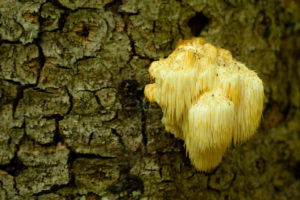Lion’s mane is an edible and medicinal mushroom belonging to the tooth fungus group.
Uses
-
Hericium erinaceus is a choice edible when young, and the texture of the cooked mushroom is often compared to seafood. It often appears in Chinese vegetarian cuisine to replace pork or lamb. This mushroom is cultivated commercially on logs or sterilized sawdust and is available fresh or dried in Asian grocery stores.
Benefits
- Brain Function: Lion’s mane may benefit older adults with mild cognitive impairment, according to a small study published in Phytotherapy Research in 2009. For the study, researchers assigned 30 older adults with mild cognitive impairment to take either lion’s mane extract or a placebo every day for 16 weeks. In cognitive tests given at weeks eight, 12, and 16 of the study, members of the lion’s mane group showed significantly greater improvements compared to members of the placebo group.
- In a more recent study (published in Biomedical Research in 2011), scientists examined the effects of lion’s mane on brain function in mice. Results revealed that lion’s mane helped protect against memory problems caused by buildup of amyloid beta (a substance that forms the brain plaques associated with Alzheimer’s disease).
- Depression: Lion’s mane may help alleviate depression and anxiety, suggests a small study published in Biomedical Research in 2010. For the study, 30 menopausal women consumed cookies containing either lion’s mane or a placebo every day for four weeks. Analyzing study findings, researchers observed that members of the lion’s mane group were less irritable and anxious and had less difficulty concentrating than members of the placebo group.
- Cancer: Preliminary research suggests that lion’s mane shows promise in protection against cancer. For instance, in a 2011 study from Food & Function, tests on human cells revealed that lion’s mane may help knock out leukemia cells.
- In addition, a 2011 study from the Journal of Agricultural and Food Chemistry found that lion’s mane extract helped reduce the size of cancerous colon tumors in mice. The study’s findings suggest that lion’s mane may help fight off colon cancer, in part by increasing activity in certain cells involved in the immune response. However, it’s too soon to tell whether lion’s mane can help prevent colon cancer in humans.
Cautions
- Little is known about the safety of long-term use of lion’s mane supplements. However, there’s some concern that lion’s mane may aggravate symptoms in people with allergies and asthma.
- Therefore, it’s important to consult your physician prior to using lion’s mane if you have a history of allergies and/or asthma.
Interactions
Unknown, please consult with your doctor.
Other names
Hericium erinaceus, bearded tooth mushroom, satyr’s beard, bearded hedgehog mushroom, pom pom mushroom, or bearded tooth fungus
References
Source: Wikipedia, https://en.wikipedia.org/wiki/Hericium_erinaceus#Culinary_use
Verywell, https://www.verywell.com/the-benefits-of-lions-mane-89474


